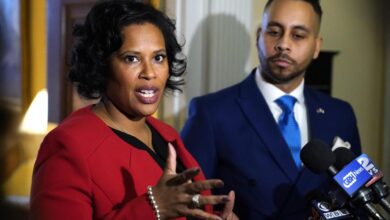Ayanna Pressley, Ilhan Omar talk black economic opportunity in Boston

BOSTON MA: January 11, 2020: Congresswomen Ilhan Omar, left, and Congresswoman Ayanna Pressley make their way to the stage for a panel discussion on economic mobility during the Congressional Black Caucuses visit to Boston, Massachusetts. (Staff photo by Nicolaus Czarnecki/MediaNews Group/Boston Herald)
The Congressional Black Caucus made its first-ever visit to Massachusetts this weekend, with U.S. Rep. Ayanna Pressley bringing her colleagues — including fellow “Squad” member U.S. Rep. Ilhan Omar — together with city leaders and activists to address the inequities facing Boston’s black and brown communities and offer solutions for their economic mobility.
Pressley set the stage from the Bolling Building, which overlooks the newly renamed Nubian Square, with a slew of stark statistics: Black households in Boston have a median net worth of just $8, while white households have a net worth of $247,000, Pressley said. Traverse a three-mile stretch of the MBTA’s bus route 1 and life expectancy drops by 30 years, she added.
“Perhaps you are growing weary and tired of these sobering statistics being enumerated. I hope you are growing even more tired of living them,” Pressley said. “These systemic disparities in health and wealth are stark, and continue to grow larger by the day.”
Yet, Pressley said, “Recent reports have shown that the city of Boston is booming. It’s simply a question as to for whom. Today we are here to figure out the answer — how the answer becomes: for us.”
Segun Idowu, executive director of the Black Economic Council of Massachusetts, said 20,000 black-owned businesses contribute more than $1 billion to the state economy, paying out $300 million each year to employ more than 12,000 black people.
But they often face trouble with financing, panelists said, noting that black entrepreneurs are more likely to be denied loans. Malia Lazu, an executive vice president at Berkshire Bank, is working on one solution — a $2 million pilot for community underwritten microloans to businesses.
Former City Councilor Tito Jackson, now venturing in the marijuana business as CEO of Verdant Medical, is looking to cannabis as the future for the black community.
“Cotton was the cash crop of our enslavement and I believe cannabis and hemp will be the cash crop of our emancipation,” Jackson said.
Moderator and current City Council President Kim Janey made note of her ordinance passed late last year to help boost minority pot shop applicants.
But the obstacles that stand in the way of black and brown economic mobility are more than just financial, panelists said, pointing to inequities in education, transportation and even in elected office that can also serve as barriers.
“We have to change the narrative about who we are and what we are capable of,” said Omar, who received a rousing ovation when she finally spoke toward the end of the panel.
“What is it going to take for us to have our businesses to thrive? What is it going to take for our businesses to even exist? What is it going to take for us to have investment in our businesses? What is it going to take to have leaders on school boards, on city councils, as state reps, as members of Congress, as president?” Omar mused. “It’s going to take us believing in us.”























































